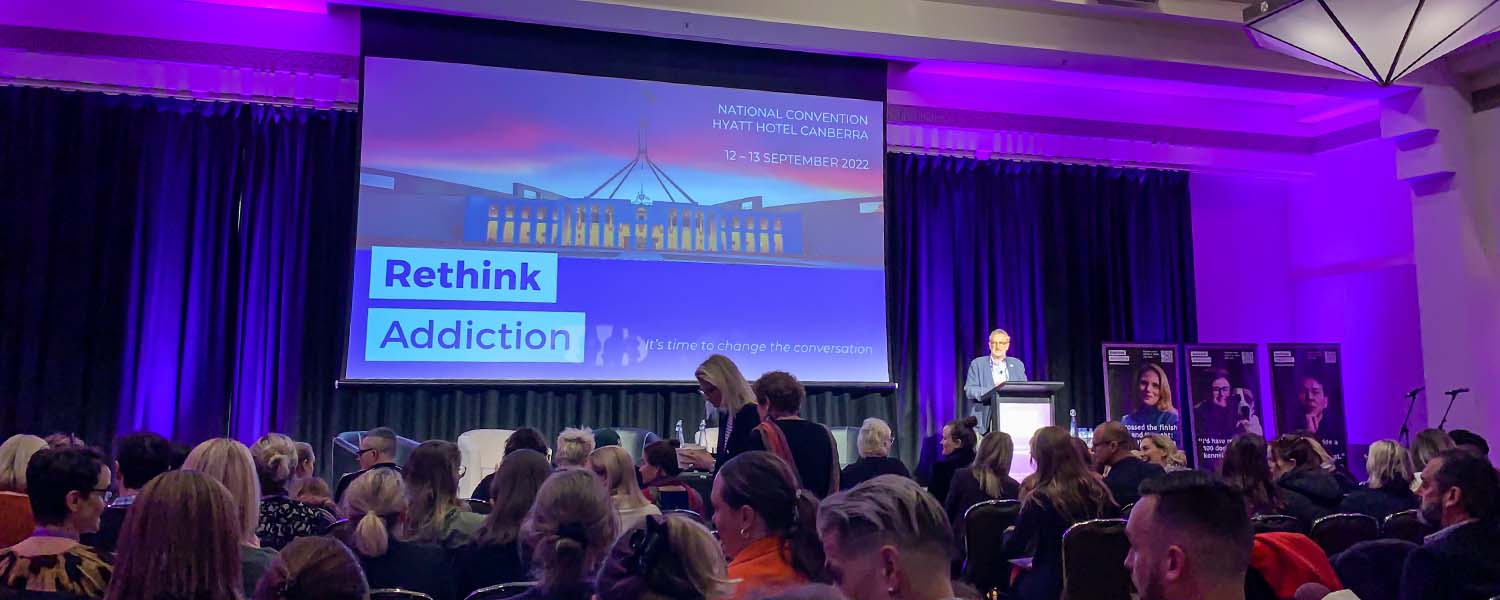Over the past two days I’ve joined 300 people at the Rethink Addiction National Convention in Canberra.
It was an opportunity to listen and learn from the speakers who all had a lived experience of alcohol, other drug or gambling addiction. It again showed how far-reaching addiction is in Australia and how it extends beyond an individual to families and communities.
These impacts also span across generations from grandparent to parent to child.
There were so many lessons from #RethinkAddiction. Here are just a few.
On the importance of lived experience, speaking out and being heard
When people share personal stories of addiction and recovery, it is powerful because it provides hope and shows people in similar situations that they aren’t alone. When the voices of people with lived experience are elevated – when they are listened to and heard – then change can happen.
‘I met someone like me. And that sparked hope.’ Shanna Whan
‘My vulnerability creates a pathway for others to connect their humanness because they feel seen and heard.’ Kate Seselja
‘Whether we are day one or a decade into our recovery – our stories are powerful – because they are something that someone needs to hear.’ Shanna Whan
‘You can’t be what you can’t see.’ Andrew Addie
‘If it’s not said, it never happened and no one can get support.’ Selba-Gondoza Luka
‘When I got out [of prison], finding that I had a voice and could use my voice… people were listening.’ Rocket Bretherton
On responsibility and culpability
Alcohol and gambling companies develop, design and market products that prey on people’s vulnerabilities. They do this to maximise profits. A greater emphasis is needed on corporate responsibility.
‘Big alcohol is undoubtedly the Goliath in this country, and we the people, are the David….but who won…’ Shanna Whan
‘The machines are designed to addict. This is government-sanctioned abuse. I’m not the problem, gambling is the problem.’ Anna Bardsley
‘The stigma and shame carefully cultivated by the gambling industry has been a key component to the exponential spread and dominance of gambling in our communities. If the individual is the problem then no-one is looking at the products, hence the industry term – problem gambler.’ Kate Seselja
On stigma and shame
Stigma and shame are barriers to accessing help. This was raised in every personal story shared. Being free of the stigma and shame was part of people’s journey to recovery.
‘I now live free from shame that was never mine to bear… a shame that knowingly belonged to the perpetrators of harm.’ Anna Bardsley
On the intergenerational impacts
Many people spoke of the intergenerational impacts of trauma, addiction and harm that rippled through families for generations.
‘Heroin was the substitute for the love my mother couldn’t give me. And she couldn’t give that love because she was taken as a child.’ Daniel Wilson
‘I am a garden variety case of unresolved trauma in a booze-worshipping culture.’ Shanna Whan
On bravery
When we refer to sharing personal stories as courageous or brave, it makes it sound out of reach, rather than normalising the practice.
‘We have to embrace our humanness and be mindful not to make sharing our stories an act of bravery, because if it’s only for the brave, people will disqualify themselves.’ Kate Seselja
On language
Language is important. How we talk about addiction is important. But we often get it wrong and there are many, many examples of fear-mongering, stigma-building headlines in the media.
‘We need to move away from the myth that we need to hit rock bottom to create change – the myth that we can’t change until we’ve hit it.’ David Campbell
So, what now?
Significant profits are being made from addiction at the expense of people, families and communities. What these stories tell us is that we do not have the right controls in place for alcohol, other drugs and gambling harm in Australia.
It takes an incredible emotional toll for people to share their personal stories again and again.
It is not fair for governments to continue to ask for these stories in every form before change is considered or made.
These voices need to be heard. It is time for governments to listen and act.
Find out more about Rethink Addiction







